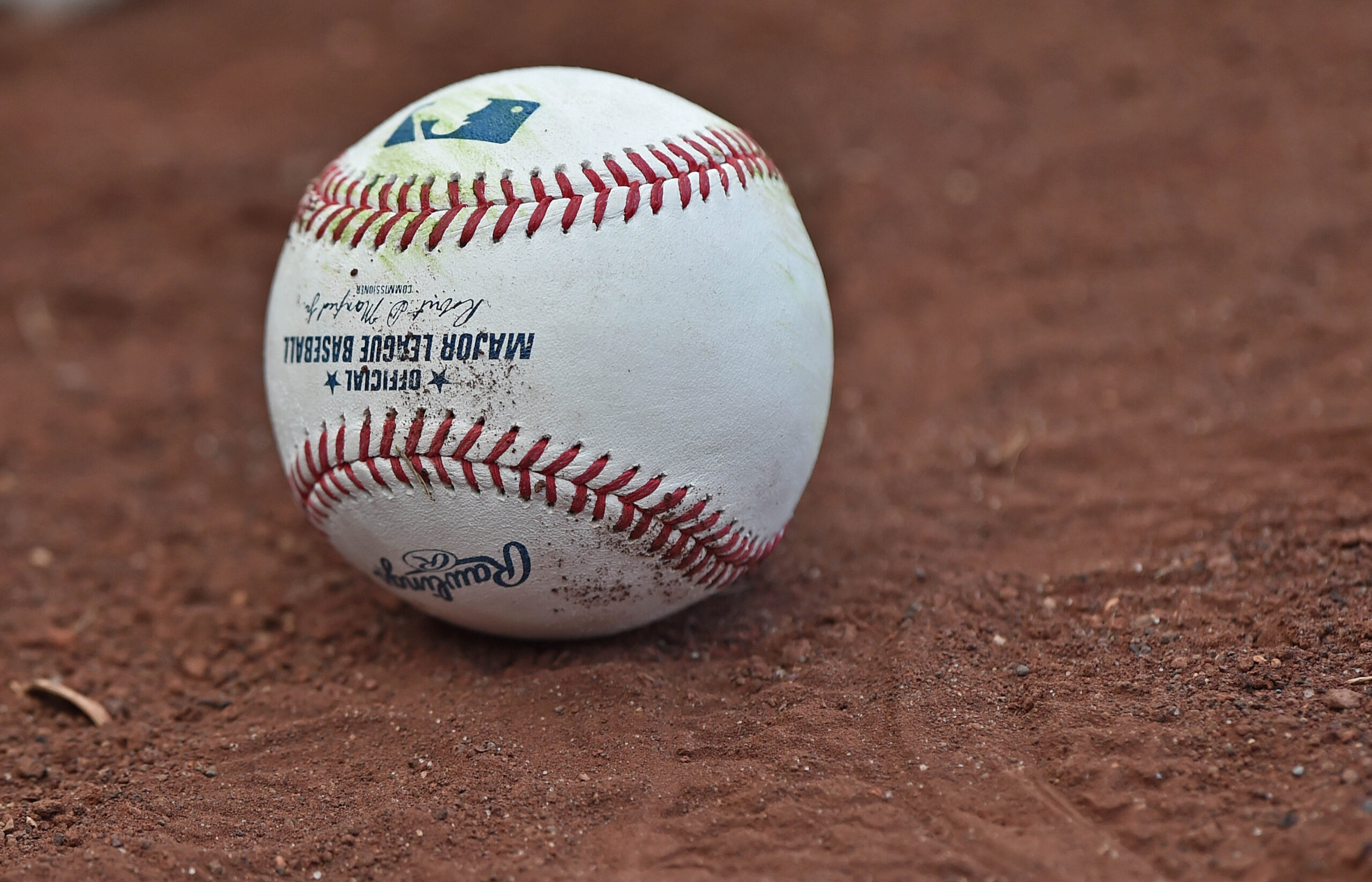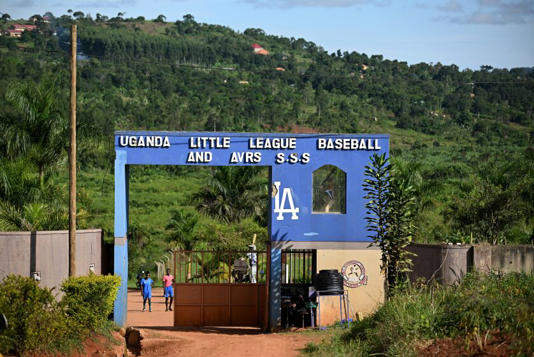

Hidden at the end of a narrow, rutted dirt road in central Uganda, wedged between a concrete wall and a hillside dotted with palm trees, is the only baseball academy run by a major league team in Europe or Africa.
The Dodger blue paint and the white interlocking LA on the archway above the entrance identify the owner, but the team will say nothing about the facility, about its interest in Uganda and what, exactly, goes on behind that concrete wall.
“The Dodgers are keeping it a secret,” said Ssempa Johnbosco, who coached the Ugandan national team to the final of the 2019 African Cup. “I think they are scared of [losing] their players to another MLB franchise.”
It’s unlikely the team will be able to keep the academy secret for long, though, because as the first big league franchise to plant its flag on soil that is rapidly becoming rich in baseball talent, the Dodgers are uniquely positioned to begin harvesting those riches.
“The baseball there is getting better,” said the Pittsburgh Pirates‘ Tom Gillespie, who has been scouting Africa for 12 years. “There’s a high level of competitiveness and because there’s not a lot of formalized sports in a lot of places in Africa, when there is baseball available, you’re drawing the best athletes. That’s not true in a lot of places.”
Only two Africans have played in the majors, with infielder Gift Ngoepe and pitcher Tayler Scott, both South Africans, combining to appear in 62 games from 2017 to 2022. (Scott is a reliever for the Dodgers’ triple-A club in Oklahoma City this season.) The Dodgers are hoping to change that, having signed two Ugandans — Ben Serunkuma, a 21-year-old reliever, and Umar Male, a 21-year-old outfielder — last year. In January another academy player, infielder Nicholas Alumai, joined the University of St. Thomas in Houston on a baseball scholarship, becoming the second Ugandan recruited to play at the Division III school in the last three years.
All four players came out of the academy in Mpigi, a transit town surrounded by lush green pastures between the Ugandan capital of Kampala and the shores of Lake Victoria. The facility, which the team is expanding, has multiple fields, a dorm, a cafeteria and a weight room. And as the guard shack next to the metal gate spanning the entrance suggests, it is closed to visitors.
Baseball was introduced to Uganda in 2002 and, as was the case in most countries where the sport is played, it was imported by an American.
Richard Stanley, a former chemical engineer for Procter & Gamble and once part-owner of a minor league baseball team, was working as a volunteer on an international development project in Uganda when he was asked to help start a baseball league for children. A year later, a soccer pitch was commandeered and a tournament for schoolchildren 12 and under was held.
“You can get a kid’s attention by bringing something different. If you bring a new toy, they want to try the new toy,” Deryk Bice, a former player turned coach, said of those early days.
Once the seed was planted, it didn’t take long for the sport to flourish, so the soccer field was quickly ditched when Stanley built a Little League complex and the Allen Vivian-Richard Stanley Secondary School in Mpigi, a complex he now shares with the Dodgers. By 2008, thanks to Stanley’s support, Uganda was playing in a regional qualifier for the Little League World Series.
Three years later it won the tournament, becoming the first African team to qualify for Williamsport, although visa issues kept the team from traveling to the U.S. So Uganda won the qualifying tournament again a year later and this time it made the trip, beating a team from Oregon in a consolation game.
“He gave us the opportunity to play baseball,” Felix Canpara, who played in the 2015 Little League World Series, said of Stanley, who spent more than $100,000 to ferry the Ugandan team to international tournaments.
“Some of us didn’t know anything about this game. It was my first time playing baseball. I was really scared of the crowd,” continued Canpara, whose team upset the Dominican Republic in its opening game. “[People] were really surprised seeing a team from Africa. And they were really surprised at how good we were.”
They aren’t surprised anymore. This winter Uganda outscored neighboring Kenya 81-3 in sweeping a three-game series and becoming the only African team to qualify for the U-18 baseball World Cup. Uganda’s U-12 team also qualified for its World Cup, although there’s no guarantee the government will be able to afford sending either team to their tournament.
“Right now our biggest challenge as a federation is to be in position to take these young athletes to the world level,” said Felix Okuye, president of Uganda’s baseball and softball association. “We are praying that we can have people who can help us make this dream a reality.”
If Okuye’s plea for travel money was addressed to the once-generous Stanley, it isn’t likely to be answered. The retired chemist, who did not respond to numerous messages for comment for this story, is apparently out of the business of funding Ugandan teams, having turned over much of his complex to the Dodgers four years ago. And though the team’s logo has become ubiquitous on caps and shirts at baseball fields around Kampala, many Ugandans say the Dodgers, unlike Stanley, have acted like the colonizers of centuries past, mining the country for its natural resources — in this case, athletes — but refusing to give back.
“What the Dodgers are doing is picking the best, the cream of the crop,” said Bice, a former Dodgers scout in Uganda. “And if you’re not the best they are going to drop you.”
Baseball equipment is hard to come by in Uganda since none of the things needed to play the game are manufactured locally and shipping them in can prove costly. Yet the Dodgers have shared little, leaving those on the other side of their walled compound to rely on gear smuggled in by missionary groups.
Dodgers president Stan Kasten declined to respond on the record to questions about the team’s investment in Uganda.
“When we don’t have balls, we use rocks. When we don’t have bats we use tree branches,” Bice said. “We’ve had to improvise.”
Yet for baseball in Uganda to improve — and for the Dodgers to cash in on their investment — grassroots support is essential. The country is the 19th poorest in the world, according to World Population Review, with a per capita gross national income of $800 a year, making it hard for many parents to keep their children fed, much less provide them with bats, gloves and balls.
“There is a big, new emerging market,” Okuye said. “A continent with a population of 1.3 billion people. A continent with an environment where people can play the whole day. They’ll be playing here even with empty stomachs. So motivated.
“So what does it mean? That the sport of baseball, the commercial aspects of baseball, need to look into the big population in Africa.”
Unlike in the Dominican Republic, where every major league team has an academy, the few players the Dodgers do invite to their Ugandan facility aren’t under contract, meaning they’re free to train there, then sign with another team — which is what happened last winter when Gillespie and the Pirates signed David Matoma, a 17-year-old right-hander and former academy prospect.
“The Dodgers wouldn’t give him a chance and the Pirates did,” said one former academy coach, who asked not to be named, fearing retribution from the team.
“I wouldn’t say the Dodgers were upset,” Gillespie added. “But there are definitely some individuals involved who don’t speak of me kindly.”
So much for secrets.
___
This story originally appeared in Los Angeles Times.
